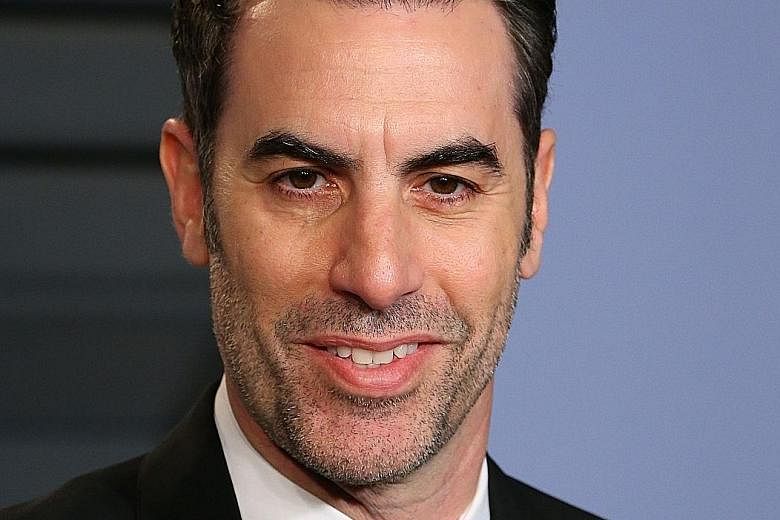NEW YORK • It is no laughing matter for the person tricked - but can he have the last laugh by suing?
It is an option being explored by American gun rights activist Daniel Roberts. He was coaxed by Sacha Baron Cohen (above), disguised as an anti-terrorism expert, into biting on a sex toy, and other embarrassing acts, while being filmed.
Mr Roberts thought he was part of a training video. Instead, he was being played for laughs, as part of an episode of Cohen's Showtime series Who Is America?.
Mr Jason Spencer resigned from his position as a state lawmaker in Georgia after Cohen convinced him to yell racial epithets in a similar situation.
Would they have a good chance of winning if they sued? Cohen and his team were deceitful in how they lured them and others into participating in the show.
Former Illinois Representative Joe Walsh said he was told he was receiving an award for his support of Israel and was prompted to read scripted remarks that advocated arming small children.
He might have a claim, no?
Not necessarily, said legal experts who noted, in most cases, it seemed that prospective prank victims signed releases designed to indemnify Cohen and his producers from legal claims.
"If I were a lawyer for a potential plaintiff, my first question would be: 'Did you sign a piece of paper?'" said Mr John Rosenberg, a media and entertainment lawyer.
Cohen has long been a magnet for lawsuits.
People pranked on television show Da Ali G Show (2000 to 2004) and in films Borat (2006) and Bruno (2009) have sued, though seldom successfully.
The difficulties arise often because the agreements people sign are purposely vague and there is indemnifying language in fine print.
Public figures like Mr Spencer must clear a higher bar to bring a defamation suit.
"Cohen can rely on the First Amendment of the United States Constitution, the right to free speech," lawyer Domenic Romano said.
"They have to show actual malice if they're going to make a claim they've been defamed."
There are anti-Slapp (Strategic lawsuit against public participation) laws that exist to make it easier to dismiss legal claims filed in free speech cases that concern topics the public might be interested in.
Legal experts said the topics in Cohen's show - frequently mocking political figures and making light of current events - would qualify.
Mr Roberts might sue Cohen for fraud, arguing he was induced into an agreement by being misled. There is an issue here though.
"If I come on to a television show believing that it's a serious, political, issues-oriented format... and I make a racist or misogynistic comment, Sacha Baron Cohen didn't defraud me into making that statement," said Mr Rosenberg.
Among the lawsuits against Cohen that had failed was one filed by two students at the University of South Carolina.
While intoxicated, they made racist and sexist comments on camera for Borat, in which Cohen plays a journalist.
A Maryland-based driving instructor sought damages based on how he was presented in Borat. He was filmed in a segment giving Cohen's character a bizarre driving lesson.
But the suits have not all failed.
In 2012, Palestinian grocer Ayman Abu Aita settled a defamation claim for an undisclosed amount after he accused Cohen of falsely labelling him a terrorist in Bruno.
"One critical distinction appears to be that it was Cohen's words there, his branding of Aita as a terrorist," Mr Rosenberg said, "and not Aita's own comments."
And, as a lawyer for Mr Aita noted at the time, the grocer had not done what so many others had done - signed a release.
NYTIMES

